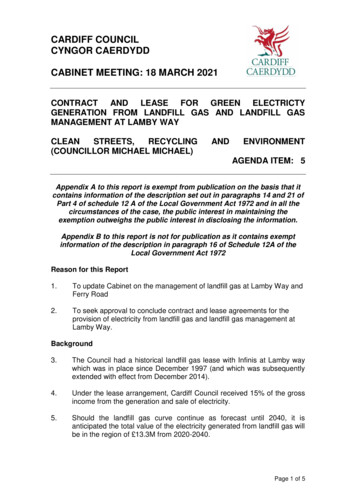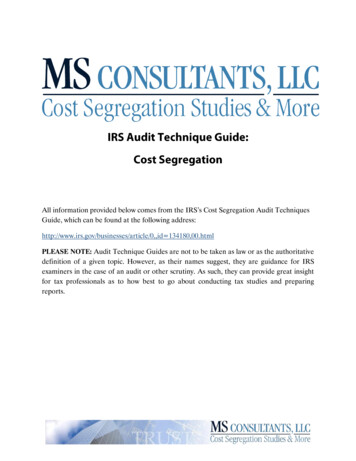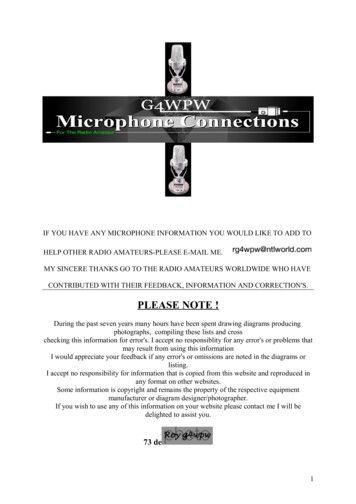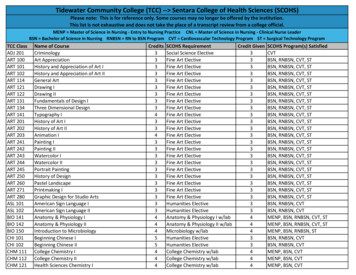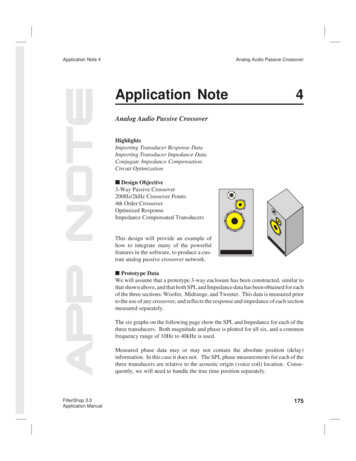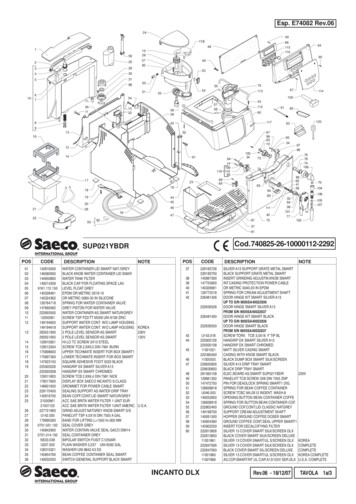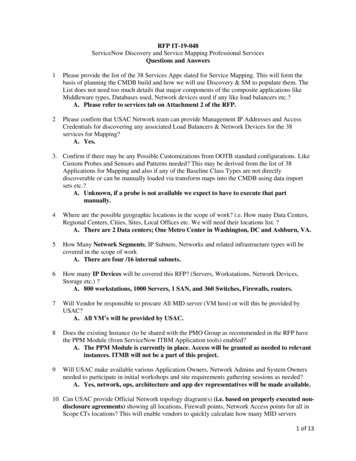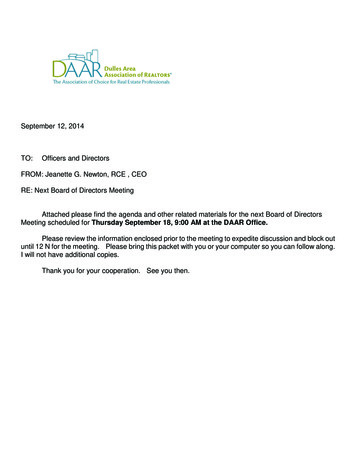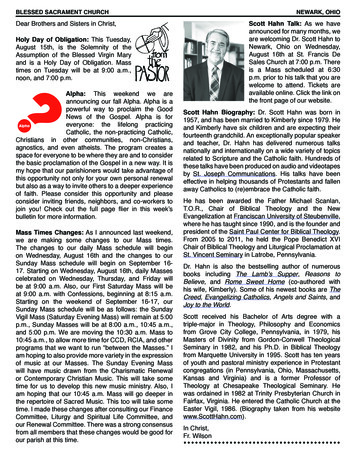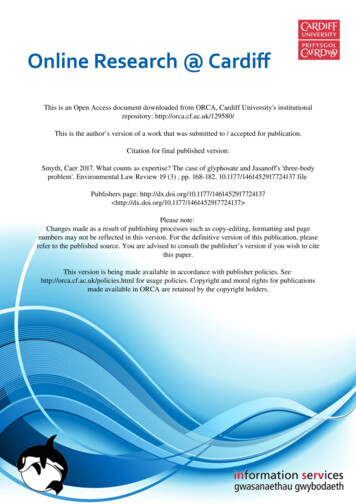
Transcription
This is an Open Access document downloaded from ORCA, Cardiff University's institutionalrepository: http://orca.cf.ac.uk/129580/This is the author’s version of a work that was submitted to / accepted for publication.Citation for final published version:Smyth, Caer 2017. What counts as expertise? The case of glyphosate and Jasanoff's 'three-bodyproblem'. Environmental Law Review 19 (3) , pp. 168-182. 10.1177/1461452917724137 filePublishers page: http://dx.doi.org/10.1177/1461452917724137 http://dx.doi.org/10.1177/1461452917724137 Please note:Changes made as a result of publishing processes such as copy-editing, formatting and pagenumbers may not be reflected in this version. For the definitive version of this publication, pleaserefer to the published source. You are advised to consult the publisher’s version if you wish to citethis paper.This version is being made available in accordance with publisher policies. Seehttp://orca.cf.ac.uk/policies.html for usage policies. Copyright and moral rights for publicationsmade available in ORCA are retained by the copyright holders.
What counts as expertise? The ase of glyphosate a d Jasa off s three- ody pro leCaer SmythSchool of Law and Politics, Cardiff University, Cardiff, UKAbstractIn 2015, the International Agency for Research on Cancer of the World Health Organisation publisheda o og aph stati g that gl phosate, the a ti e i g edie t i ‘ou dup, Mo sa to s leadi g he i ide,was p o a l a i oge i to hu a s . Sho tl afte this, the European Food Safety Authority reassessed gl phosate s li e e fo use in the European Union, and deemed it to be safe for human use.Both of these expert advisory bodies faced condemnation and accusations of political bias as a resultof these assess e ts. E plo i g Jasa off s th ee- od p o le , this a ti le e a i es the conflictingconclusions of the International Agency for Research on Cancer and the European Food SafetyAuthority, exploring what the contested assessments of glyphosate reveal about the entangledrelationship between scientific expertise and law-making.IntroductionGlyphosate is the active ingredient in Roundup and Roundup-related products, and is the herbicidewith the largest production volume in the world.1 Roundup is produced by the Monsanto Company,one of the o ld s ost su essful life-sciences companies; it is their flagship brand.2 It is currentlyunclear whether glyphosate poses a health risk to humans. Many researchers claim that glyphosateposes no health risk; studies by Giesy et al (2000) and Williams et al (2000) (two heavily cited studiesfrom respected journals) found that glyphosate poses no health risk, with Williams et al clearly statingthat, u de p ese t a d expected conditions of use, Roundup herbicide does not pose a health riskto hu a s .3 However, there have been growing concerns over widespread pesticide and herbicideuse and its impact on the environment and on public health.4 Glyphosate has been a focus of thisconcern. It garnered public attention in 2015, as the cancer research agency of the World HealthOrganisation (WHO stated that it as p o a l a i oge i to hu a s ,5 and as its licence for usein the European Union (EU) was due for renewal. The treatment of glyphosate by these various publicbodies illuminates the complex interplay between political action, scientific research and public and1International Agency for Research on Cancer, World Health Organization, IARC Monographs Volume 112:evaluation of five organophosphate insecticides and herbicides (2015a) 2.2Marketline, Company Profile: Monsanto Company: SWOT Analysis (2015) 43G. Willia s, ‘. K oes a d I. Mu o, Safet E aluatio a d ‘isk Assess e t of the He i ide ‘ou dup a d itsActive Ingredient, Gl phosate, fo Hu a s ,Regulatory Toxicology and Pharmacology 117Environmental Law Review 2017, Vol. 19(3) 168–1824D. Buffi a d T. Je ell, Health a d E i o e tal I pa ts of Gl phosate F ie ds of the Ea th, Jul.Available at: s glyphosate.pdf (last accessed 4 March2016) 8; Y.H. Kim, J.H. Lee, K.W. Cho, D.W. Lee, M.J. Ka g, M.J. Lee, K.Y. Lee, S.Y. H a g a d N.K. Lee, P og ostiFactors in Emergency Department Patients with Glyphosate Surfactant Intoxication: Point-of-Care LactateTesti gBasic & Clinical Pharmacology & Toxicology 604; N. Guha, K.Z. Guyton, D. Loomis and D.Ba upal, P io itizi g Che i als fo ‘isk Assess e t Usi g Che oi fo ati s: Examples from the IARCMonographs o Pesti idesEnvironmental Health Perspectives 1823; C. Malagoli, S. Costanzini,J.E. He k, M. Mala olti, G. de Gi ola o, P. Olea i, G. Palazzi, S. Teggi a d M. Vi eti, Passi e E posu e toAgricultural Pesticides and Risk of Childhood Leuke ia i a Italia Cou it016) 219(8) InternationalJournal of Hygiene and Environmental Health; S.H. Bai a d S.M. Og ou e, Gl phosate: E i o e talContamination, Toxicity and Pote tial ‘isks to Hu a Health ia Food Co ta i atio23(19)Environmental Science and Pollution Research 18988.5International Agency for Research on Cancer, World Health Organization, IARC Monographs Volume 112:Glyphosate (2015b) 78.1
corporate interest that forms the policy-making process and highlights the multiple challenges ofevidence-based6 environmental policy-making.This a ti le ill use Sheila Jasa off s th ee- od p o le as a frame through which to examine thehalting progress of glyphosate licence renewal through the various bodies of the EU. Broadly speaking,the p o le Jasa off s f a e add esses is that ule the e pe ts is fu da e tall i o pati le ithrule by the people.7 The relationship between science and the state has grown ever more fraught andcomplex, moving away from the post-war vision of science-state cooperation set out by VannevarBush in 1945.88 Many factors have influenced this move and have consequently influenced thepolitical accountability of scientific expertise. Jasanoff asks us to consider the problem of expertlegiti a as a th ee- od p o le , pa i g atte tio to each sphere in which scientific knowledge isimplicated in the political process. These are:1. The body of relevant scientific knowledge.2. The body of the individual scientific expert.3. The collective bodies that advise governments.9This analytical framework enables its user to distinguish the various stages at which science and lawinteract. The potential risk in employing this framework is that it could portray a static vision of thedynamic interactions of scientific knowledge and political process; this article will attempt to avoidthis over-compartmentalising. Jasanoff criticises existing accountability mechanisms, stating that:No national [or supernational] decision-making system has as yet taken on board the fundamentalSTS insight that experts construct – they do not simply find – the knowledge base on which theyrest their hybrid analytic deliberative judgments.10With this failing in mind, this article will examine the role of scientific knowledge, scientific expertsand the political bodies through which scientific expertise is adopted in environmental policy-making,using the case study of glyphosate in Europe as a lens through which to consider these science-stateinteractions. With growing public concern in environmental issues and with the role of scientificexpertise in risk assessment and regulation unclear, it is critical that the multiple levels and processesin which scientific expertise and law work together are properly understood, and that possibleweaknesses, inequalities and conflicts are identified.Introducing the concepts: Knowledge, expertise and expert advisory bodiesScience in law: Scientific knowledge6Evidence-based policy denotes an intention to formulate policy around the best available evidence and for itto be informed by expert knowledge. Scientific expertise gains greater prominence in policy areas that rely oncomplex, modern technology and natural science; there are many such areas in environmental policy.Practitioners contend that a focus on evidence in decision-making has led to an important distinction betweenvalues and evidence. There has been a gradual shift in the factors informing decision-making, away from a focuson values and available resources; the expectation in contemporary society is that decisions rely on soundevidence.7E. Fishe , ‘e ie Essa – The Enigma of Expertise – of S Owens (2015) Knowledge, Policy and Expertise: TheUKRC on Environmental Pollution 1970–JEL 551, 552.8S. Jasanoff, Science and Public Reason (Routledge: Abingdon, 2012) 151.9S. Jasa off, Episte i Su sidia it – Co-e iste e, Cos opolita is , Co stitutio alisEuropeanJournal of Risk Regulation 140.10See Jasanoff, above n. 8 at 1632
[T]he regulation of science and technology, whether to further innovation or to control risk, canfruitfully be seen as a kind of story-telling by communities situated in particular times and placeswho are attempting to deal with unsettling or disruptive changes in their environments.11The statement above represents the social constructivist view of scientific knowledge, highlighting theinfluence of public values and the political context on the scientific knowledge that informs policy. Ifscientific knowledge is understood to be socially constructed, do we still recognise its legitimacy?Certain scientists take the social constructivist approach in science studies as an attack on science,uncomfortable perhaps with this questioning of the positivist worldview; this conflict is ably describedby Levine among others.12 Scientific knowledge is valued in law-making due to its perceivedobjectivity. It seems wiser to rely on scientific facts rather than politically motivated actors; truth isbetter se edi pe so al age ts athe thafalli le hu a ei gs .13 This view relies on anunderstanding of scientific knowledge as Truth, hermetically sealed and ready to be factored intopolicymaking considerations. It ignores the fact that scientific knowledge used in law-making is sifted,analysed, assessed and compiled. The nuanced findings with which scientists contend are reframedas unambiguous facts, making them more amenable to law-makers. Moreover, as Jasanoff notes, thequestions that contemporary policy-makers ask of science are rarely of a kind that can be answeredby scientists from within the parameters of their ho e dis ipli es .14 Rather, policymakers requireinterdisciplinary scientific knowledge, thereby intensifying the level of human involvement in theproduction of scientific knowledge.While the socially constructed nature of scientific knowledge might undermine its legitimacy in thelegal sphe e, S ie e s i ol e e t i the legal sphe e si ila l damages its own legitimacy. In TheNormative Structure of Science, Merton identified four norms upon which the ethos of modern scienceis built: o ga ised skepti is , ou alis , u i e salisa d disi te ested ess.15 Thesefundamental norms of scientific endeavour are shaken when science enters the legal system and whenit enters the marketplace.16 Communalism is undermined when study findings are kept confidential asa form of proprietary knowledge. Moreover, disinterestedness and skepticism can no longer beguaranteed if scientific knowledge is used with a particular aim in mind. Scientific facts, when they areemployed in justice or regulatory systems, become evidence.17 They are facts viewed in a certain lightfor a certain purpose.The objective truth of scientific knowledge is affected by the scientific experts who work with it; it issimilarly shaped by the prevailing political and moral context. When scientific knowledge isincorporated in environmental policy-making, for example, it is influenced by social assumptionsaround nature/culture divisions, around notions of validity, causation, safety and risk.18 Whilereflecting on the norms and assumptions embedded in the production of scientific knowledge,Jasanoff notes that law and science operate according to different notions of truth.19 This differencestems from the distinct purposes and contexts of science and law; that legal facts are specific andretrospective, while science facts tend to be more general and forward-looking; that timeliness is11S. Jasanoff, Designs on Nature: Science and Democracy in Europe and the United States (Princeton UniversityPress, 2005) 23.12G. Le i e, What is S ie e Studies fo a d Who Ca es?/ Social Text 113.13S. Jasa off, Just E ide e: The Li its of S ie e i the Legal P o ess4(2) Journal of Law, Medicine &Ethics 330.14Above n. 8 at 152.15R.K. Merton, The Sociology of Science: Theoretical and Empirical Investigations (University of Chicago Press,1973) 268.16See Jasanoff above n. 13 at 329.17Ibid, at 329.18See Jasanoff above n. 11 at 13.19Above n. 13 at 332.3
more of a concern for legal facts than it is for science facts; and that the ethics of employing andproducing these facts vary in these different contexts.20Competing considerations of legitimacy can pull science and law-making in different directions.Scientific legitimacy is built on the four norms identified by Merton, within which the objectivity ofscientific knowledge is central. The legitimacy of political bodies is dependent on the extent to whichthey uphold public values and serve the public political will. These legitimacy claims are fundamentalto science and to law; does this mean that scientific knowledge and political systems must exist incontinual disharmony? Winickoff et al propose that greater public involvement in developing sciencepolicy decision-making ould help e su e that the episte i autho it of sou d s ie e is ala edby due consideration of public values, thereby enhancing the legitimacy of legislation dependent onscientific knowledge.21 Political processes, typically more attuned to public concerns, should lead onissues that provoke a high level of public concern, as is the case with GM technologies.Science in law: Scientific expertsThe legitimacy of scientific expertise in policy-making has faced sustained criticism; Collins and Evanstethis i estigatio the se o d a e of s
with the largest production volume in the world.1 Roundup is produced by the Monsanto Company, one of the Áolds uost suessful life -sciences companies; it is their flagship brand.2 It is currently unclear whether glyphosate poses a health risk to humans. Many researchers claim that glyphosate
